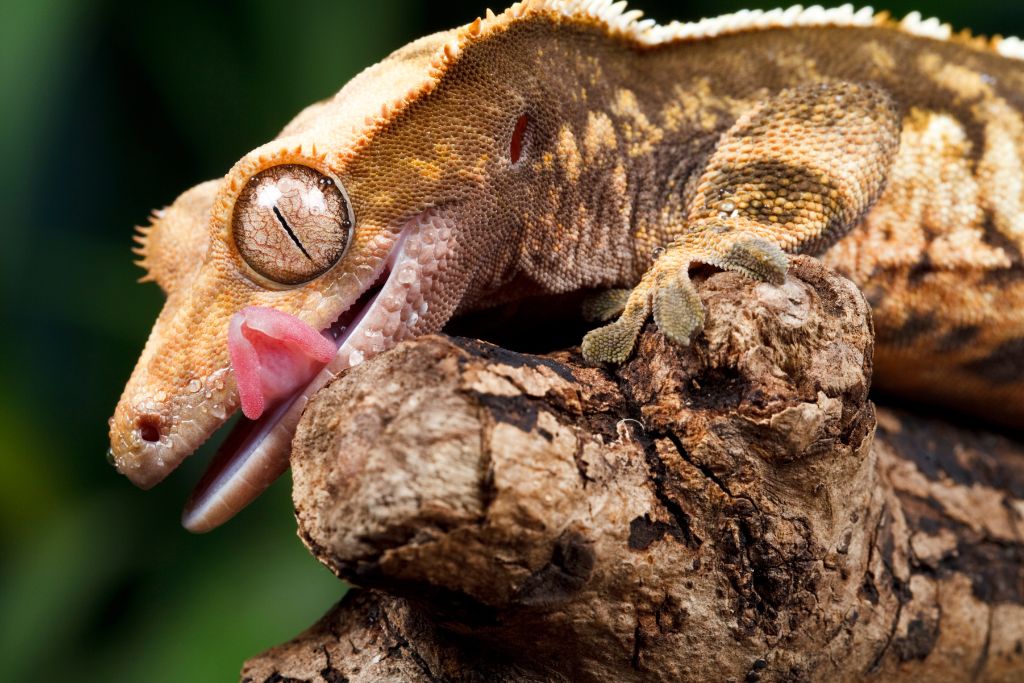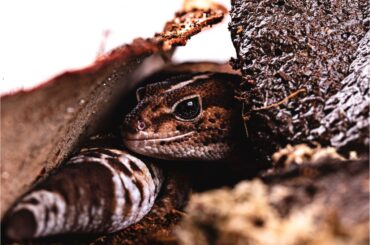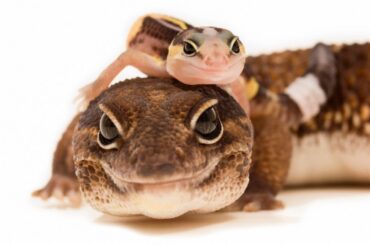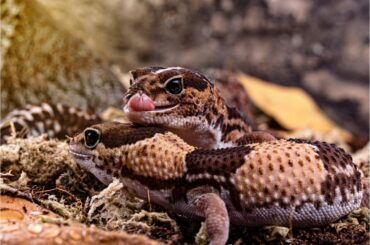Are your crested gecko’s eyes sunken in? Find out if your scaly friends are healthy here! This post discusses the need of keeping your crested gecko healthy for a happy relationship. Why are these tiny soul windows so important? We’re here to find out.
Many people love crested geckos as pets due to their fascinating personality and unusual appearance. These delightful reptiles make beautiful additions to any household. Like all pets, their health and happiness are important.
Eye health is essential. Sunken eyes in crested geckos can be a telltale sign of underlying health issues.
These little pets depend on their eyes for communication and navigation, just like humans! Unravel the mystery of sunken eyes and discover how to keep our crested geckos thriving and vibrant.
What Causes Sunken Eyes in Crested Gecko?
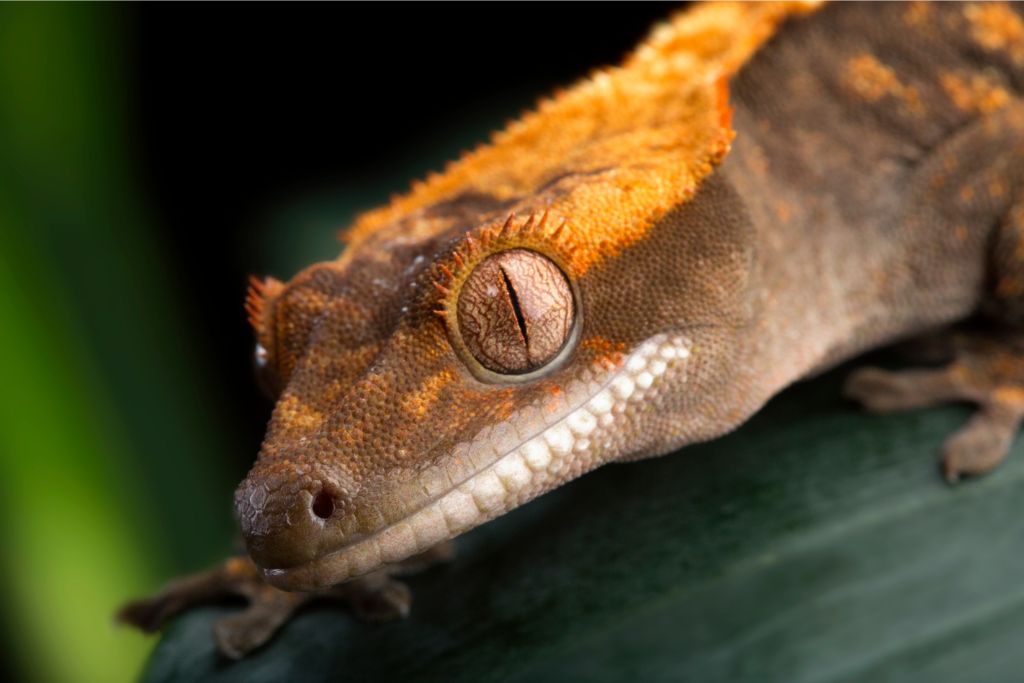
Sunken eyes in crested geckos refer to a condition where their eye sockets appear more profoundly set or hollow than usual. These charming reptiles have large, expressive eyes, and sunken eyes can be a noticeable change in their appearance.
A sunken eye can signal health issues or be a typical aspect of a crested gecko’s activity, especially in specific settings.
In some cases, crested geckos may exhibit sunken eyes temporarily, which is a normal response to certain situations. For example, when shedding their skin, their eyes may appear hollow as the new skin forms underneath the old layer.
They may partially close their eyelids while resting or sleeping phases, producing the appearance of sunken eyes.
Long-lasting open eyes or other unusual symptoms may signal a health issue that needs care. Whether crested geckos’ sunken eyes are normal or pathological depends on their context and duration.
If sunken eyes persist for an extended period or are accompanied by other unusual behaviors or signs of illness, it could indicate a health issue requiring attention and care.
They are sensitive. Poor humidity, nutrition, or health can cause sunken eyes. Monitoring and maintaining correct humidity, temperature, and nutrition can prevent and treat sunken eye health issues.
Understanding the context and duration of sunken eyes in crested geckos is crucial in determining whether it’s normal or abnormal.
Normal Occurrences of Sunken Gecko Eyes
Gecko eyelids can sink during resting or eating, which is typical. In peaceful states like sleep, geckos’ eyes naturally sink into their sockets because they don’t have eyelids. It protects their eyes from outside distractions like a built-in eye shield. So, don’t worry if your gecko’s eyes look sunken when sleeping or eating insects.
Lighting changes can also make geckos’ eyes appear sunken. Darkness may dilate their pupils, making their eyes appear deeper in their sockets. After the illumination improves, their eyes will seem fine again..
Unhealthy Crested Gecko Sunken Eyes as a Sign of Illness
Eyes sinking into sockets may indicate health difficulties. This is often caused by dehydration. Sunken eyes result from geckos’ inability to retain water. Dehydration is dangerous, so act fast.
But dehydration isn’t the only possible cause of sunken eyes in crested geckos. Sometimes, they can have retained eye caps, which are like tiny pieces of old skin covering their eyes.
Another cause is metabolic bone disease, which can produce sunken eyes and other health issues. Thus, if your gecko has sunken eyes, you must see a reptile doctor to diagnose and treat it.
How to Treat Crested Gecko Sunken Eyes
Here’s how to treat sunken eyes in crested geckos:
- Gentle Cleaning: Start by gently cleaning your gecko’s eyes with a damp, soft cloth. Be super gentle, like you’re taking care of a fragile treasure!
- Hydration Boost: Give your gecko a little extra water to sip on. Use a clean, shallow dish, like a tiny gecko-sized swimming pool.
- Warm Baths: If the sunken eyes continue, try giving your gecko a warm bath. It’s like a spa day for them! This can help with shedding and eye problems.
- Vet Visit: If the eyes still look sunken, it’s time for a trip to the vet. They’re the gecko doctors who can provide proper medicine if needed.
What to Do if You Suspect Sickness
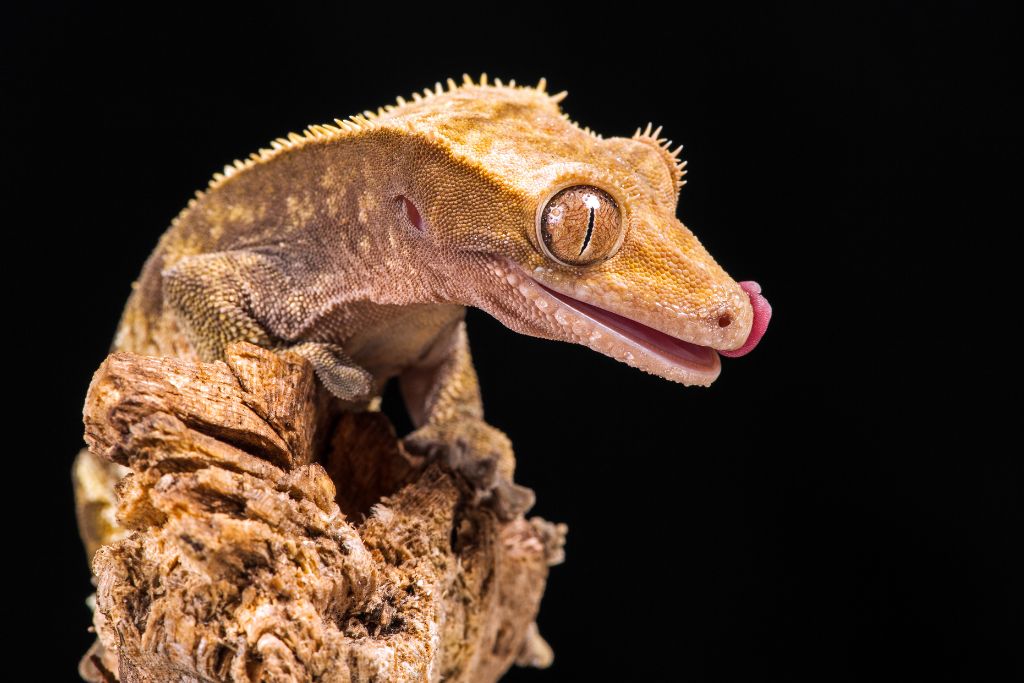
If you discover your gecko has sunken eyes, take action to protect them. Sunken eyes may indicate dehydration, so check their water bowl first. Keeping it full of fresh water will keep your gecko hydrated. Additionally, monitor their enclosure’s humidity by using a hygrometer to and modify their enclosure humidity as needed. Don’t dry out geckos—they need humidity.
Make sure their habitat’s temperature is within your gecko’s suggested range. If you’re unsure about any of these features or your gecko’s condition doesn’t improve, consult a reptile vet. They can advise and treat your gecko to return it back to health and happiness.
Prevention: Ensuring Geckos’ Eye Health
Keeping your pet gecko healthy and happy is essential, especially regarding their eye health. To ensure your gecko’s well-being, maintain the conditions in their enclosure.
This means providing them with a cozy and comfortable home. Geckos need warmth and humidity to thrive, so ensure their habitat has the right temperature and humidity levels. This helps prevent dry eyes, which can be uncomfortable for them.
Feeding your gecko a balanced diet is another crucial aspect of their eye health. Make sure to offer them a variety of insects and even some fruits or vegetables. This diverse diet helps provide essential nutrients that support their overall health, including their eyesight. Just like us, geckos need a well-rounded diet to stay strong and see clearly.
Lastly, be mindful of the substrate you use in their enclosure. Avoid sharp or abrasive materials that can cause eye injuries. Opt for softer substrates, like coconut coir or paper towels, to create a safe environment for your gecko. These measures will keep your gecko’s eyes healthy and brilliant, keeping them happy pets for years.
Conclusion
Gecko owners must be cautious and give their pets the most excellent care. Providing clean water, adequate food, and monitoring their surroundings are crucial to their health. If your gecko seems sick or not acting normal, visit a reptile vet. Care for your gecko’s health and happiness is worth it, and you may have a great trip together!
The care and attention of gecko owners is essential. To stay healthy and happy, these fascinating reptiles need a good home, diet, and regular health checks. If your gecko shows signs of disease or behavioral changes, owners should seek professional help.
FAQs
Does Light Hurt Crested Gecko Eyes?
No, regular ambient light does not hurt crested gecko eyes. However, avoid exposing them to direct, intense light, such as sunlight or strong artificial lighting.
How Do You Fix a Gecko’s Eye?
If a gecko has an eye issue, it’s best to consult a veterinarian with experience in reptile care for proper diagnosis and treatment. Do not attempt to fix a gecko’s eye issue yourself.
How Do Geckos Keep Their Eyes Moist?
Geckos, including crested geckos, keep their eyes moist by licking them with their tongues. They also rely on humidity levels in their enclosure to maintain eye moisture.
Why are My Crested Gecko’s Eyes So Small?
Crested geckos have small eyes as an adaptation to their nocturnal lifestyle. This helps protect their eyes from excessive light.
Do Crested Geckos Prefer Light or Dark?
Crested geckos prefer darkness. They are primarily nocturnal and thrive in low-light conditions, so providing them with hiding spots and a dimly lit enclosure is ideal for their well-being.

